- Home
- Francine Mathews
The Cutout cc-1 Page 3
The Cutout cc-1 Read online
Page 3
Scottie would not be deceived by long hair and sunglasses.
She tapped twice and waited.
His eyes slid over to hers, slid away.
“Come in and shut the door.”
She positioned herself squarely between the chief and the vague middle distance he was studying and said, “What are you going to do?”
“You've seen the tape?”
“I've seen Eric.”
He smiled grimly. Unlike Cuddy, Scottie didn't bother to question her loyalties.
Thirty years in the butt holes of the world, Scottie would have said, had taught him all he needed to know about loyalty. Either Caroline Carmichael was a terrorist mole or she was a victim like the rest of them. That was a question for the Agency polygraphers to answer.
“How fortunate that you never remarried. Any idea, Mrs. Carmichael, what our fair-haired boy is up to?”
“None whatsoever. Did you set this up, Scottie?”
A faint smile.
“Now that would have been magnificent. But even I cannot come up with a good reason to snatch Sophie Payne. She's too short and too intelligent for my taste.”
“Never mind that. Let's talk about Eric. Why pretend to be dead for more than two years? Why lie to all of us?”
“I don't know.” He pushed himself away from his desk and stood up. “Only Eric can answer those questions, Caroline, and unfortunately he's incommunicado at the moment. Our first duty is to find the Vice President. Everything else is homework.”
He was right, of course; Payne's life hung in the balance. The small matter of a dead man's resurrection would have to be ignored for a time.
“It seems fairly obvious that she's not in a German hospital,” Caroline said.
Scottie shrugged himself into his suit jacket. He favored glen plaid, like a latter-day Duke of Windsor; he must own twenty variations on the theme.
“The White House is beginning to realize that, too. None of the Berlin facilities has admitted her. President Bigelow is screaming for information, and the Germans are giving him squat.”
“Did you hear Payne's speech?”
“I imagine we'll hear it ad nauseam before the day is out. It was impolitic, under the circumstances, but hardly enough to spark a kidnapping. I've watched the footage over and over, Caroline. The bombing, the confusion, the medevac chopper it all took about nine minutes. That argues a fair amount of sophistication and planning. We're dealing with professionals.”
“Of course,” she replied.
“But which ones?”
He held her gaze.
“If you don't know, then I'm certainly not going to guess.”
“What is that supposed to mean?”
“Well, Caroline, you were married to him. You tell me. Of all the terrorist groups Eric worked, whom did he want to screw the most? Because he's obviously jumped into bed with somebody.”
“Christ,” she muttered.
“I hope to God it's not 30 April.”
“I doubt he'd still be alive if it were.” The statement was hard.
“Krucevic and his kind taste betrayal in their mothers milk. They'd have blown Eric's cover inside of three minutes and killed him in three and a half.”
“He's our only lead, Scottie. To the Vice President. You realize what that means?”
“He's a killer, Caroline, and he's out in the cold. Dare Atwood has asked for a briefing. I'm due right now on the seventh floor.”
“You have to tell her about Eric.” It was half statement, half question; Caroline dreaded the answer.
“I was hoping you might do that,” Scottie said.
Four
Langley, 8:40 a.m.
So what am i supposed to believe, Eric? Tell me that.
Caroline follows Scottie's elegant back through the broad corridors connecting New Headquarters with Old. The walls here are mostly glass. The space is arranged as a museum. She inventories pieces of the Berlin Wall and OSS radio transmitters without seeing them. What am I supposed to think? That you're a hero, or a traitor to the cause? A madman or a savior? What's the story this time, Eric?
She has been here before. She knows this tight place between reason and heartache as well as she knows the contours of her bed. Words of caution clamor in her brain, and once — for Eric — she would have flung them to the four winds.
But now there is her training to think of. Her position within the Intelligence community. All the professionalism that is expected of her. And what the hell does she owe the bastard, anyway? Two and a half years, Eric. Alive. And not one word.
Their heels echo on the scarred linoleum, then are swallowed in the rush of other feet thudding from corridor to corridor. The halls of espionage are awash with bureaucrats, with Case Officers and Managers, Technicians and Administrators. Caroline is an Analyst, and has been for years. Well before the word was a job title. When she considers her life — when she attempts to picture it — she sees a loop of unbroken thought, coiled like a strand of DNA. She is comfortable in her head. She observes and judges from a distance. It is a talent she was born with, one that earns her a living. Now work reinforces nature — or perhaps it is nature alone that determines the structure of her days, the cubicle in which she sits, the green light of the Intelligence cables flickering softly in the filtered air. Her Agency job is somehow inevitable, a genetic predestination.
Every day she slips off the George Washington Parkway and slides behind the safe shelter of her desk. She flips on her computer. She downloads the truth. She follows an account, which means she tracks 30 April through the wilderness of news flashes, clandestine reports, transcripts of illicit conversation beamed down from satellites orbiting in space. She follows the shadow of a beast unseen and attempts to describe its height and color. She briefs the Policy-makers — she tells them what has been and what might be — and they trust her enough to listen.
Caroline has earned a reputation for reliability. And when the Policy-makers award her their respectful silence — when they gaze at her steadily, hanging on every word — Caroline glows with a sense of triumph. What the Policy-makers do with her information is their own affair. Her job is beyond policy. She is the High Priestess of Reason, she lives in Objective Thought. It is the deepest safety she has ever known.
Reason can be trusted, reason doesn't let you down. Reason won't leave you grieving without so much as a postcard.
In Caroline's life, betrayal has always come from what she cannot control.
“You have a very high analytic,” her Agency interviewer had said as he flipped through her application all those years ago, “and the introversion is practically off the charts.”
“High analytic?” Caroline repeated. “Is that good?”
He looked up from the file, dark eyes accusing. He was in his late thirties and might possibly have been attractive once, but was running now to fat. His wedding band was smudged, his tie soiled; he smelled mustily of failure. He told her his name, and she assumed that he lied. She decided to call him George.
“Find the company of strangers utterly draining? Parties exhausting? Do you often stay home, in fact, at the last minute?”
“Sometimes. What has that got to do with the job?”
The office had been part of a square and featureless building on the outskirts of Vienna, Virginia. She sat before Georges desk, her skirt suddenly too short for comfort, uncertain what to do with her knees. She was waiting for the bus to the polygraph center, where it was rumored that three applicants were dismissed for every one who survived. In the past ten months, the FBI had unearthed every drama of her college years, every friend she could claim, every joint she might regret. She was twenty-three and on the verge of security clearance. Only the box and the wire, the unconscious guilt that might trip her up, lay between her and the job.
“You're an INTJ, Ms. Bisby,” said George.
This was well before Eric and the name she assumed like an official alias; well before Mad Dog came howling from the u
nderbrush.
“Only four percent of the general population fall into that category. But it's heavily represented among Agency analysts. Almost thirty percent, in fact. You've found your way home. Congratulations.”
“INTJ?”
“Just a classification. In the Myers-Briggs Type Indicator. It means you're rational rather than emotional; that you make swift judgments; that you prefer to work in quiet and solitude.” The murky eyes slid away from her own. “More comfortable, perhaps, with ideas than people, Ms. Bisby. It's not a criticism. Just the classic description of an Intelligence analyst. Your ticket to the job.”
“I see,” Caroline replied.
“So that's a good thing, right?”
Now Scottie is pushing the button for the elevator and Caroline is trying not to replay in her mind that piece of German videotape, Eric's head emerging from the chopper like a fox from its den. Beside her. Cuddy Wilmot rocks on his worn heels, his hands shoved into his pockets. He has retrieved his polyester tie from his desk drawer and scrounged a suit jacket from a friend. It hangs unevenly above his wrinkled khaki pants. Caroline is aware of Cuddy's unspoken sympathy; it clings to him like sweat. But he says nothing. She folds her hands over her stomach and studies the panel of lights above the elevator, tracking the descent. What hooks everybody is the information, the vanished George confides in her ear. Satellite intercepts, foreign news translations, classified reports from controlled agents — more pieces of the puzzle than you ever knew existed, delivered to your desktop with the tap of a finder. Access, Ms. Bisby.
Access gets the High Analytics every time.
There is such a thing, Caroline might reply, as knowing too much. As drowning in all the data the world flings at you.
Eric, she thinks, how the fuck could you do this to me?
When they entered the room, Darien Atwood was gazing through the rain — spattered window at the belt of trees dividing the Agency campus from the George Washington Parkway. Caroline registered beeches and maples, a preponderance of pin oak. The branches wavered and dissolved in sheets of chilling rain. The DCI ignored the three of them, as though concluding some kind of mental conversation; and so they approached her desk in silence, lowly supplicants before an altar. Scottie reached a furtive hand to his perfectly knotted tie.
Caroline had known Dare Atwood for eleven years. Well before she was DCI, Dare had managed the regional office in which Caroline cut her analytic teeth.
Despite the gap in their ages, they were fellow travelers: smart women impatient with mediocrity, demanding of themselves and everyone around them. Dare's progress through the bureaucratic ranks — her ascension to the Senior Intelligence Service and, eventually, to the post of Director of Central Intelligence — had placed a natural distance between them; but if Caroline possessed a mentor in the clandestine world, it was Dare.
She was familiar, through long association, with the small personal tics that betrayed Dare's feelings. She studied the DCI's rigid back and saw that she was enraged.
Dare was a tall woman with a face as lined as a wind fallen apple. Her black wool dress could have graced a Shaker; her smooth gray hair resembled Joan of Arc's.
Her heels were never more than two inches high. She fairly screamed a capable practicality; in another century, she would have commanded a boarding school for young ladies, or ruled a kingdom through the convenience of a husband. The DCI permitted herself two luxuries: a wardrobe of brilliantly colored Hermes scarves purchased through the years in Paris, and a deep topaz stone, cut in a cabochon, that she wore on her middle finger. They seemed revelations of an interior life far richer than her appearance inferred.
Like Caroline, Dare was born an analyst. She, too, was a High Priestess of Reason. Caroline realized she was depending upon that fact this November morning. Dare would find a way out of Eric's labyrinth. It was just a question of time.
“It's three o'clock in the afternoon in Central Europe,” Dare said to the rain beyond her window.
“Berlin was hit at twelve. They've had three hours to get out of the country.”
“In a helicopter,” Cuddy Wilmot amended.
“That means they could be anywhere.”
“If they're intelligent, they'll have ditched the chopper within minutes and switched to cars.” Scottie's voice was dismissive; they all knew that Eric was intelligent.
“They'll assume a few hours' lead time while the dust settles and we're confused about the Vice President's whereabouts. But at this point, the chopper's a dead end.”
“Assume they're in a car, then,” Dare said impatiently.
“Headed where? Toward Switzerland or Poland?”
She was looking now at Scottie, her back to the streaming trees, her arms folded tightly across her chest. Rage, still, in every line of her body; rage completely contained. Toward Eric? The situation? Or Caroline?
“They could've gone to ground in Germany,” Scottie told her.
“Even in Berlin, there are a thousand places they might be hidden.”
“Not with the entire Voekl security force on the loose.” The impatience was scathing now, a personal slap. Dare despised easy answers.
“You've seen CNN. The men in black are turning Berlin upside-down.”
“If I'd gone to the trouble to stage that medevac rescue,” Caroline said, “it'd be for one reason — to divert attention, and buy time. Then I'd get the hell out of Dodge before the borders closed.”
“So you're betting on Eastern Europe.” Dare could have added, Where Eric knows the roads. The thought, unspoken, hovered over all their heads.
“We have no way of knowing where they've gone,” Scottie objected, “until we know who they are.”
“Then let's hear an educated guess,” the Director snapped.
“It's what we're paid for.”
“The German police are claiming that the bomb was set by gastarbeiters,” Cuddy said tentatively, “the legal aliens Chancellor Voekl wants to send back to Turkey.”
“I've seen that report. It's bullshit.” Dare gripped the edge of her desk and eyed the three of them.
“Sophie Payne was not kidnapped by a bunch of disaffected gastarbeiters. At this point, the U.S. is the only friend those people have. They'd be mad to strike against us.”
“The Turks make a convenient scapegoat for the Voekl regime,” Caroline pointed out.
“So convenient, I'd almost believe Fritz Voekl ordered the hit himself.”
“Then he should have done it before Payne opened her mouth.” Scottie frowned.
“That speech can only have been an embarrassment to him.”
“Incitement to riot, in fact,” Dare agreed.
“Next, the Germans will say the Veep brought this whole mess on herself. Then they'll send us a bill for the Brandenburg.” She twisted the topaz on her finger.
“So what are we left with?”
“A presumed-dead case officer on the wrong side of the law.” Scottie, Caroline noticed, was avoiding her eye. The man possessed depths of sensitivity long untapped.
“And with whom is the case officer cavorting?” Dare asked.
“Any ideas, Caroline?”
Too many, in fact. I am drowning in Access. The plane disintegrating, the children like candy wrappers in the updrafts over Turkey — Eric, how the fuck could you do this to me? Access, Ms. Bisby. Gets the High Analytics every time.
Never mind the man like a fox in his den. Assemble the facts. Marshal your arguments. Analyze.
“Eric worked a number of terrorist targets over the years,” she told Dare.
“The PFLP-GC. Abu Nidal. And right at the end, Bin Laden. But he was obsessed with only one — the 30 April Organization.”
“Thirty April.” The DCI traced an intricate pattern on her dark green blotter.
“An East European terrorist group with acknowledged hostilities toward the United States. Neo-fascists, reactionary extremists, the type who hate to see women in power.”
“Sophie
Payne and her liberal agenda would push all their buttons.”
“Not my first choice for the Vice President, Caroline.” Dare's voice was harsh.
“They're certifiable.”
“And perfectly capable of pulling off this morning's hit. Ever since the NATO intervention in Kosovo, they've been looking for a way to hurt us.”
“Scottie, what account was Eric working in Budapest?” Dare asked.
“At the time of his death — or what we thought was his death — he was Chief of Station.”
“In other words,” Caroline said, “he wasn't supposed to be working anything.”
“Serving more in the role of grand coordinator of everyone else's targeting, is that it?”
“Eric never really took to management,” Scottie admitted apologetically.
“He couldn't give up the field, Dare. He thought 30 April was too difficult a target for junior CO's. So he tried to recruit within the organization himself.”
“And did he succeed?”
The Counterterrorism chief hesitated.
“I believe he was closer to penetrating them than we'd ever been before.”
Dare took a turn around the room, thinking it through.
“Thirty April bombed a plane that Eric Carmichael was supposed to be on. Is that why the plane went down? Because Eric was on the passenger list? It seems a bit excessive, killing two hundred and fifty — plus people in order to get one man — but we know that Krucevic's boys are a law unto themselves.”
“Or .. .” Scottie said delicately.
“Or Eric Carmichael was working with 30 April well before MedAir 901, and got the bomb on that plane himself. Again, a bit over the top as a means of declaring oneself dead — but who's to argue with the irrational?”
Involuntarily, Caroline shook her head.
“You don't think so?” the DCI challenged.
“How much did you know about your husband's work in Budapest, Carrie?”
I knew about silence. I knew withdrawal. The shrouded figure in the bed each morning, the retching over the porcelain bowl.

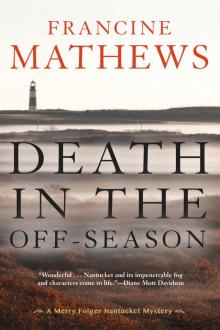 Death in the Off-Season
Death in the Off-Season Death in Rough Water
Death in Rough Water The Alibi Club
The Alibi Club Death of a Wharf Rat
Death of a Wharf Rat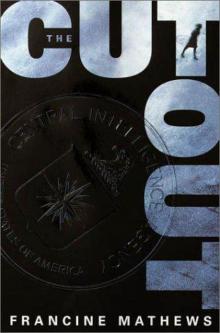 The Cutout
The Cutout The Secret Agent
The Secret Agent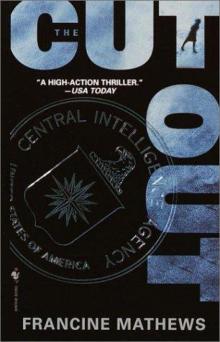 The Cutout cc-1
The Cutout cc-1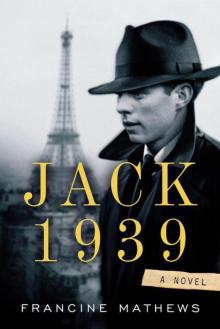 Jack 1939
Jack 1939 Death in a Cold Hard Light
Death in a Cold Hard Light Blown
Blown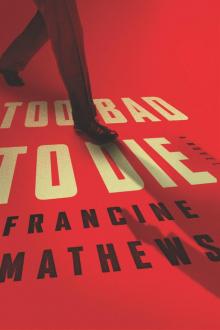 Too Bad to Die
Too Bad to Die